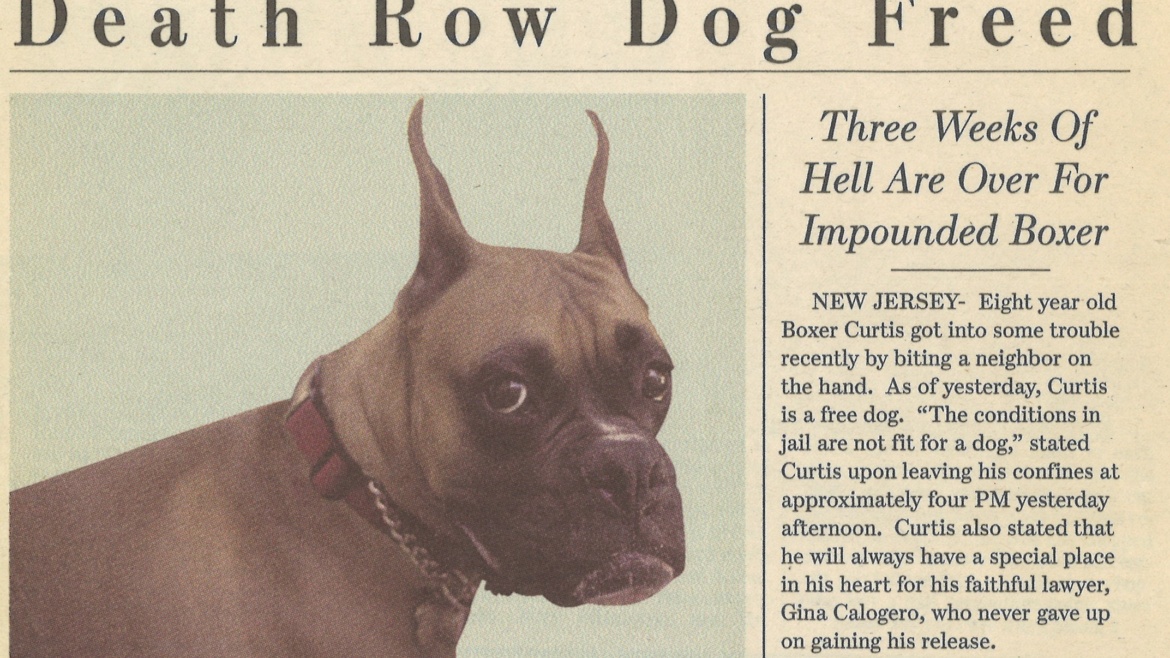What is a dangerous dog? Why don’t you want your dog labeled “potentially dangerous”?
In New Jersey, the term “dangerous” is not defined by the breed, someone’s subjective opinion of your dog, or the dog’s prior history – it can be defined by a single act. The Vicious and Potentially Dangerous Dog Act of New Jersey, found at N.J.S.A. 4:19-17, concerns dogs that are either vicious or potentially dangerous.
When a dog injures a human or kills a domestic companion animal (a pet) in an unprovoked attack, the local Animal Control Officer (ACO) is required to impound the dog and hold the dog until one of three things happens:

- The owner surrenders the dog, and it is euthanized,
- A trial is held in the local municipal court to determine whether the dog is vicious, potentially dangerous, or neither; OR
- The parties reach a negotiated settlement
The definition of a potentially dangerous dog is a dog who injures a human in an unprovoked attack, or kills or severely injures a domestic companion animal in an unprovoked attack, and that the dog is likely to severely injure a human or kill a domestic companion animal in the future. The State (the town) has the burden of proving by “clear and convincing evidence” that the dog is potentially dangerous that is, all the elements of the offense.
If a dog is declared potentially dangerous, that label will follow the dog for the dog’s entire life, no matter where you live. The dog must be registered with a special license as “potentially dangerous” and the yearly fees are between $150 and $650, depending on the town where you live. The dog will have to wear a special red license tag and be tattooed with the license number – or, if the ACO is reasonable, a microchip. Among other onerous requirements of the law, the owner will have to keep the dog in an enclosure with a top, sides and bottom that prevent the dog from digging or jumping out, the door to the enclosure must be locked, and there must be a 6-foot-high fence around the enclosure. The owner must put signs on the property and the cage warning of a potentially dangerous dog. The dog can only be walked with a muzzle on a strong, 3-foot leash. The fencing, kennel, muzzle, and leash must be approved by the ACO and the property is subject to periodic inspection. You will probably have to provide insurance against future injuries, which could be expensive with your dog’s history – and the town may even require that it is named on the insurance policy. If you sell or give away the dog, or if you move to a different town, the ACO of the new town must be notified, and they have to approve the enclosure, fencing, muzzle and leash in your new home. If the dog dies, the owner must notify the town and provide proof. This is not a comprehensive list! And if the owner violates any of these provisions, the dog is impounded again and you have to start the process all over again.
The only bright spot of this law is that the ACO, the prosecutor and the owner can enter into a negotiated settlement in which they agree on less than all of the provisions of the law. If there is no settlement, there will be a trial.
This is not a do-it-yourself situation! If you find your dog “in jail” at the local shelter, you should hire experienced counsel. The law is complicated, confusing, and not often encountered by the judge and the prosecutor, so they may not give the dog’s owner accurate information. This is not intentional – they may not know the law or, worse, they may think they know the law. They often try to push a settlement with onerous terms on a naïve defendant, playing on your worst fears. They may tell you that your dog was already declared dangerous, which is impossible unless and until you have a trial. They may even tell you that if you don’t agree to these things, your dog will be put down!

Make sure you ask your lawyer how many potentially dangerous dog cases they have handled, how many settled, how many went to trial, how many appeals did the lawyer file, and what was the outcome of each case. I have handled dozens of these cases since 1994 – ten years ago I stopped counting and the total was around 50. Most of my cases settled. A few went to trial. In the one case I lost, I won on appeal. I have filed at least three appeals of cases where the owner had represented themselves in court and lost. I have represented pit bulls, Rottweilers, boxers, Dobermans, a black Labrador retriever and many mutts. Although we cannot guarantee a result, we can promise that we will represent you zealously. We know that your dog is a member of your family and we will treat you, your case and your dog, seriously.




